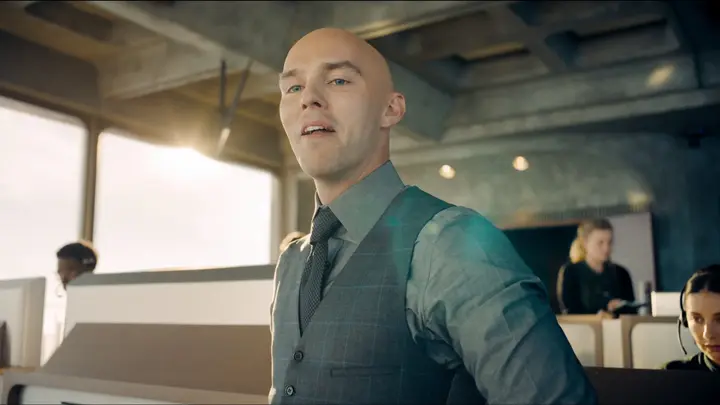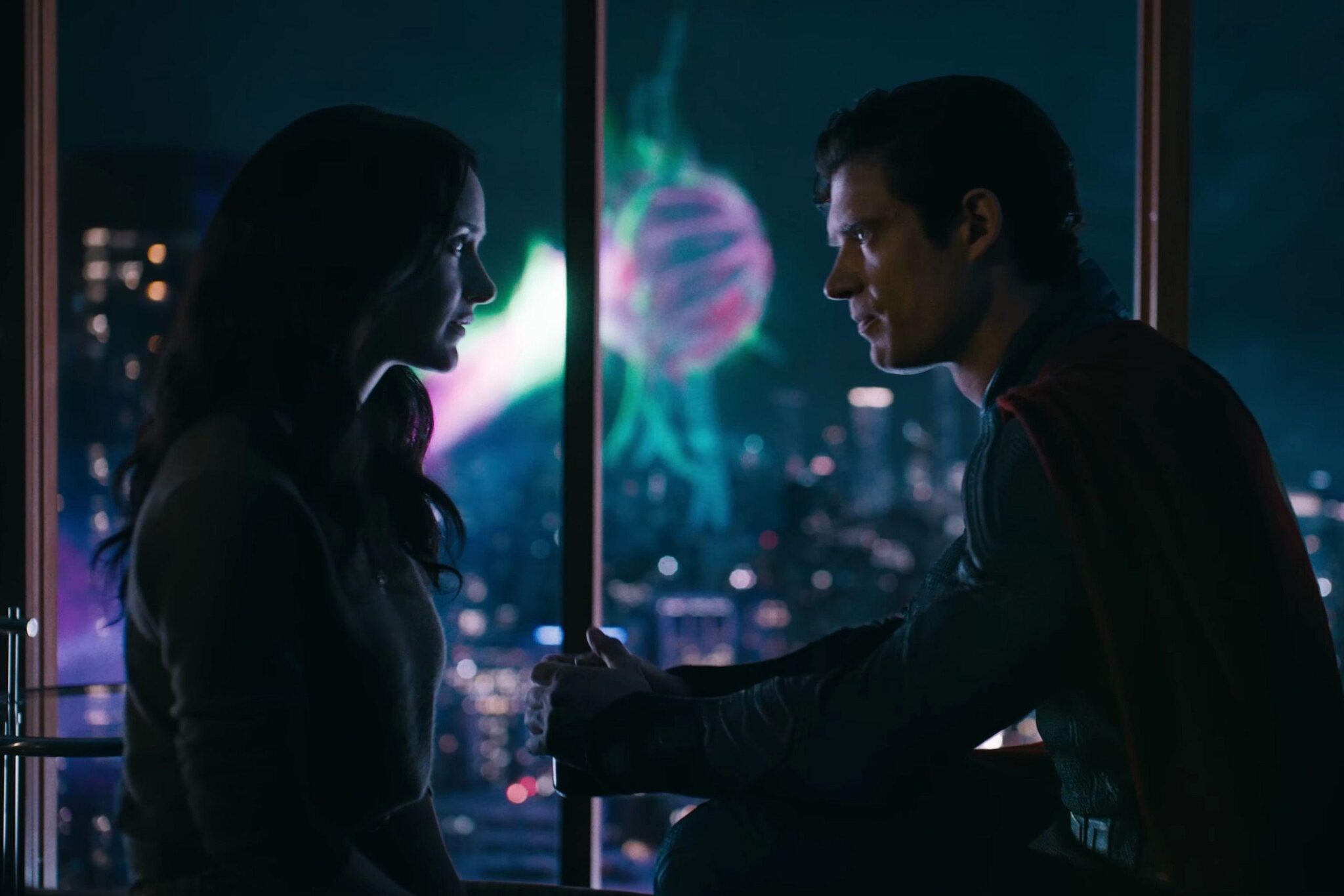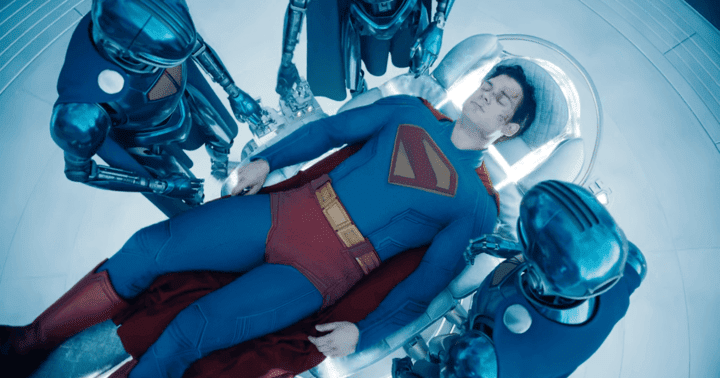James Gunn’s Superman is a dizzying and exciting adventure. Concerned more with story and character, and with a visual flair that isn’t afraid to be cheesy, Superman soars simply because it is unashamed to be a Superman movie. It’s also unashamed of being a comic book movie: Keven Feige take note.
But more than anything, Superman is a James Gunn movie. Written, directed, and produced by him, it contains all his strengths, flaws, and quirks. I loved every second of it. How could I not? Evil billionaires getting their comeuppance, Mr. Terrific (Edi Gathegi) getting his due, and bringing sex and romance back to comic book movies? Gunn’s Superman delights not because it is trying to copy Marvel, but by doing what they have not.

Above all, the strength of Superman comes from Gunn making HIS superman movie, much in the same way Zach Snyder made Superman in his image. Love it or hate it, Superman is indefatigably Gunn, right down to the boob jiggle, which I appreciated. Yet, underneath all of the juvenile fun is a real heart with a real conscience, begging us to meet the times with some sort of moral force. But that doesn’t mean we can’t have a little fun along the way.
True, as the head of the now official DCU, Gunn has an unusual amount of creative freedom. Yet, if this is the kind of movie Gunn will champion and usher through production, then I’m here for it. By that, I mean movies filled with heart and imagination that their characters talk beyond mere slogans. For years, I’ve bemoaned the state of comic book movies in that everyone is too busy quipping or spilling exposition, but people rarely ever talk.
Well, when one of your main characters is Lois Lane (Rachel Brosnahan), you best believe there’s talk. Yes, David Corenswet’s Superman is the real star of the show, but Gunn utilizes Lois in a way that is true to her character and imbues a healthy dose of sex and romance into the oddly prudish genre. He even finds a way to make Lois a proactive character that subverts some long-held tropes without shouting about it.
Lois is the polar opposite of Clark in that as a journalist, her job is to be mistrustful and kind of a bitch. But it’s her honesty that shines through and her demand for justice that makes Clark and us fall for her. Gunn understands this, and the scenes between Corenswet and Brosnahan are some of my favorites from the movie.
But the thing that Gunn understands more than anything, more than characters, is how little plot matters, or how it’s okay to be strange, colorful, and earnest. The film is littered with colorful characters who are allowed little moments to flesh out who they are. Whether it’s Guy Gardner (Nathan Fillion) in a diner eating cereal or the falafel dude laying it all on the line for Superman, the world of Gunn’s Superman feels lived in in a way few movies of this stripe do.
Gunn gets that Superman, possibly more than any other comic book character, is a symbol. Timeless and durable, he is a character made as an act of defiance against fascism. People will rant about how Superman is “overpowered” or that, because he is so good, he is boring. Except these criticisms miss the very thing that makes Superman, well, super. His powers are a representation of how being kind, caring, engaged, and hopeful is kryptonite to authoritarian regimes that seek to squash the light within us. To make us fear the light and have us accustomed to the darkness in the world and within ourselves, to the point that we don’t fight back.
As for Clark’s decency being a boring trait, again, I say, it is a power in and of itself. Those in power would like to see a callous and uncaring populace so that they may build Alligator Alcatrazes as far as the eye can see, and make game shows out of deportations. As corny as it may sound, like Gunn’s script says, “being kind is punk rock” simply because it is the one thing authoritarianism can never quite find an end run around.
Corenswet, as Clark, is among the best to don the cape. Primarily because he is one of the few who is allowed to truly play the dichotomy. Perhaps duality is the wrong word. He is allowed to show the similarities, the way that both are the same, but it is only our perceptions of him that change.
There is no setup, no explanation, no dithering about paying lip service to past iterations. There’s a disarming earnestness about him, the way he cares for everyone, alien and human alike, but isn’t without his flaws. But that’s only because he views the world as Fred Rogers did, as a place filled with beauty and wonder, and he cannot understand how everyone else is so blind to it. Fascism is a hell of a thing.

Gunn understands that authoritarianism is so recognizable that the conflict between two made-up countries is both timely, yet also a prime example of how history too often rhymes. You can easily look at the conflict between Boravaria and Jarhanpur and see the current Palestinian genocide. But it is also eerily representative of other conflicts.
But what Gunn understands more than his MCU comrades is how Superman is a symbol, but he is not the hero. The hero is us, the people who aren’t bulletproof and yet run into the fire anyway. We run into the fire because we must, for burning is preferable to letting those in power destroy our humanity.
The moment from the trailer, so it’s not a spoiler you gloomy Guses, of the small child planting the Superman flag while the invading army threatens to massacre him and others, doesn’t lead to Superman whisking in to save the day. (That IS a spoiler, but it doesn’t matter). For the people are standing up for themselves, and will fight regardless if the Man of Steel is there or not. But the flag, like the Bat-signal, calls to the decent of humanity and other heroes show up, because that’s the point, there are heroes everywhere, if only they had the courage to act.
Gunn’s frequent collaborator, Henry Barham, the DP behind Gunn’s Guardians and Suicide Squad as well as Doug Liman’s semi-daring remake of Road House, brings an infectious joy to the visuals of Superman. Gunn and Barham continue the real legacy of the DC films, which, unlike their billion-dollar franchising counterpart, is that they are not afraid of being comic book movies. Sex, violence, lofty themes, and personality are in abundance in a way that makes most of their films, regardless of box office or critical success, interesting, in a way that a series of films made under “the studio as the auteur” can never be.
Is every frame a painting? No, but then again, that is a phrase that I think is overused and misunderstood. It forgets that cinematography isn’t about still shots but about movement, storytelling through visuals, and while at times Gunn and Barham resort to pedestrian framing and editing, when it counts, there are moments of very real spectacle, splendor, and utter delight. I don’t care what anyone says, Superman flying towards the camera, knocking out some guy’s teeth, or having Cat Grant (Mikaela Hoover) be essentially eye candy, all point to a sense of play that studios keep trying to excise from the genre. Hoover, it must be noted, understands the assignment to the point that I demand a Grant spin-off.
It’s why they are called cape-shit movies. Because once you take away everything that makes the movie artful, then all you’re left with is marketing and filmed radio plays.

Gunn’s Superman spins a lot of plates, and they don’t all stay on their respective poles. Still, while not every emotional moment lands with the force of one of Superman’s punches, the film sidesteps the issue of so many other Superman films. Primarily, it doesn’t use the nostalgia for Richard Donner’s Superman, a film that shifted the paradigm and has become the blueprint for almost every other comic book afterwards, much to their detriment. Superman instead has nods, such as John Murphy and David Fleming’s score, which pays more than a little tribute to John Williams’s classic score.
I will admit Gunn and company lean a little too heavily on the theme occasionally, but I didn’t mind so much because, as someone who used to play the trombone, the Superman theme was the first song I ever learned to play on that godforsaken instrument. One could call it nostalgia, except what the theme conjures up in me isn’t a longing for the past, but a host of sense memories that make me grateful for having lived.
This is to say nothing of how Gunn populates his film with a variety of people. Modern blockbusters have become populated almost entirely with GQ cover models, none of whom fuck, curse, or have any real thoughts or emotions. In response, Gunn has stuffed his Superman with a bevy of beautiful people and ordinary people, who have a beauty all their own. But they also have thoughts, desires, and dreams that go beyond a mere cameo or setup for a future movie that may get canceled because this one didn’t pan out the way they hoped.
Clark’s parents are not dashing movie or TV stars. They instead look and sound like real people from Kansas. One particular moment has Ma Kent (Neva Howell) using the phone in the same way, hand to God, I’ve seen my mother use. The screen is filled with average-looking people, beautiful people, and everyone in between. It’s as if the film understands, films are more visually interesting when you have variety.
As someone who has long bemoaned how no one talks in superhero movies, or rather, how little dialogue matters other than to be used as exposition or state the theme, Gunn’s Superman is a feast for the ears as well as the eyes. At one point, Clark says, “What the hay,” and as a mid-westerner it is a line that spoke to me in a deep communal sense. The only thing that would have made it better would have been if Clark had said “Ope,” but I understand that may be diminishing the quadrant appeal.
But the scene between Clark and Lois where they discuss Superman’s actions is one of the best, partially because it’s been so long since a superhero movie had a scene where two characters, you know, actually have a damn conversation. God, I loved this movie.
It’s been three days since I saw the movie, and weirdly, one of the things that spoke to me the most is how Gunn understands, not only the best, but the worst about us. People like Lex Luthor (Nicholas Hoult), that “diseased maniac”, we call them billionaires now, who uses his gifts for little else than hurting people. He is a bad guy with a capital ‘b’, and yet he has loyal servants, loyal co-workers, people who sign up to work for him, to participate in his inhumane activities with relish. Like the Raptors – armed guards of Luthor’s who act as prison guards for Lex’s illegal jails, as storm troopers for his illegal and fascist commands, and Gunn never needs to overtly mention how sad this is.
But, again, we live in interesting times, that while it may feel unique, for indeed it is, it shares some remarkable similarities with the past. One of them is that, for as long as there will always be people willing to stand up and do the right thing-there will always be cowards who work for the authoritarians for no other reason than that they like hurting people too. The minions in Superman aren’t faceless; they have personalities, and many seem like nice people, yet they eagerly help Lex Luthor try and not just defeat Superman, but kill him. To paraphrase the middling competitors, there will always be people like them.
Superman is a reminder that blockbusters can speak to the times. That they can be political and comment on the world in which they were made. A breath of fresh air, Superman does the impossible, and makes you believe a man can fly, at least for a couple of hours.
Images courtesy of Warner Bros. Pictures
Have strong thoughts about this piece you need to share? Or maybe there’s something else on your mind you’re wanting to talk about with fellow Fandomentals? Head on over to our Community server to join in the conversation!

